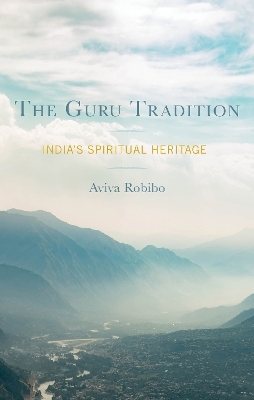
The Guru Tradition
Lexington Books (Verlag)
978-1-7936-4999-7 (ISBN)
The Guru Tradition: India's Spiritual Heritage discusses the natures and roles of both guru and of the s śiṣya, or disciple, as depicted in the Upaniṣads and Dharma Śāstras. The entirety of this analysis, of guru and disciple, is developed into a paradigm by which both the ancient and modern Guru Tradition can be more thoroughly understood. Four pivotal gurus from the twentieth century (Ramakrishna Paramahansa, Sri Aurobindo, Ramana Maharshi, and Paramahansa Yogananda), who have impacted the spiritual fabric of both east and west, are juxtaposed and discussed alongside this paradigm. This study is conducted from the perspective of Advaita Vedānta, the Indian philosophical system of nondualism.
Aviva Robibo is an independent scholar of Indian philosophy and religion. She is a scholar-practitioner and a certified teacher of meditation.
Section I: The Ancient Guru Tradition
Part I: Initiation Into Self-Knowledge or Brahmavidyā
Chapter 1. Seeking and Approaching a Guru
Chapter 2. Self-Knowledge is Learned from the Guru
Chapter 3. Adhikārin: The Worthy Disciple
Chapter 4. Upaniṣadic Examples of Adhikārins
Part II: The Gurukula: Living with the Guru
Chapter 5. Traditional Enrolment in the Gurinula
Chapter 6. Brahmacarya
Chapter 7. The Guru-Disciple Relationship
Part III. Sādhanā: The Practice of Self-Knowledge
Chapter 8. The Practice of Self-Knowledge Through Service: Sevā
Chapter. 9 The Practice of Self-Knowledge Through Austerities: Haṭha Yoga and Prāṇāyāma
Chapter 10. The Practice of Self-Knowledge Through Study: Svādhyāya
Chapter 11. The Practice of Self-Knowledge Through Meditation: Dhyāna
Part IV: Transformation Through The Guru’s Transmission Of Self-Knowledge: The Purpose Of Sādhanā
Chapter 12. Results of Initial Sādhanā
Chapter 13. Advanced Levels of Sādhanā
Part V: Methods Of The Guru
Chapter 14. Guru-Disciple Dialogue (Guru-Siṣya Samvāda: An Outer Process of Evolution
Chapter 15. Churning (Manthana): The Inner Process of Evolution
Part VI: The Archetypal Guru: An Upaniṣadic Paradigm
Chapter 16. Guru Consciousness is Brahman Consciousness
Chapter 17. Guru: The Embodiment of Brahman Consciousness
Chapter 18. Yājñavalkya: An Archetypal Upaniṣadic Guru
Section II: The Modern Guru Tradition
Part VII: Four Modern Gurus: Their Self Realization
Chapter 19. Ramakrishna Paramahansa (1836-1886)
Chapter 20. Sri Aurobindo (1872-1950)
Chapter 21. Ramana Maharshi (1879-1950)
Chapter 22. Paramahansa Yogananda (1893-1952)
| Erscheinungsdatum | 17.09.2024 |
|---|---|
| Verlagsort | Lanham, MD |
| Sprache | englisch |
| Maße | 160 x 235 mm |
| Gewicht | 581 g |
| Themenwelt | Geisteswissenschaften ► Geschichte ► Regional- / Ländergeschichte |
| Geschichte ► Teilgebiete der Geschichte ► Religionsgeschichte | |
| Geisteswissenschaften ► Religion / Theologie ► Hinduismus | |
| ISBN-10 | 1-7936-4999-5 / 1793649995 |
| ISBN-13 | 978-1-7936-4999-7 / 9781793649997 |
| Zustand | Neuware |
| Informationen gemäß Produktsicherheitsverordnung (GPSR) | |
| Haben Sie eine Frage zum Produkt? |
aus dem Bereich


